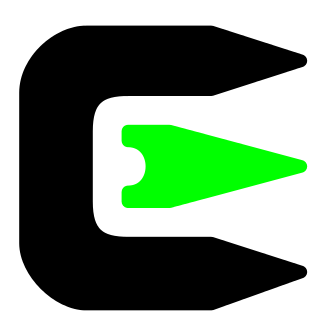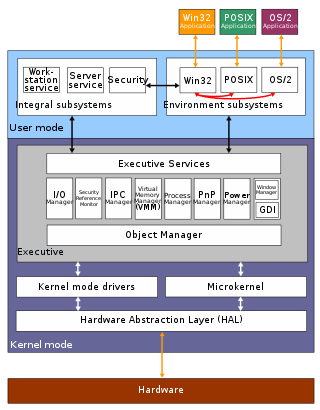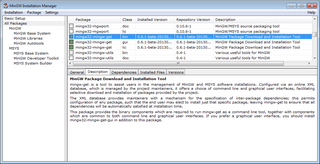Related Research Articles

Bash, short for Bourne-Again SHell, is a shell program and command language supported by the Free Software Foundation and first developed for the GNU Project by Brian Fox. Designed as a 100% free software alternative for the Bourne shell, it was initially released in 1989. Its moniker is a play on words, referencing both its predecessor, the Bourne shell, and the concept of rebirth.

Cygwin is a free and open-source Unix-like environment and command-line interface (CLI) for Microsoft Windows. The project also provides a software repository containing many open-source packages. Cygwin allows source code for Unix-like operating systems to be compiled and run on Windows. Cygwin provides native integration of Windows-based applications.

KornShell (ksh) is a Unix shell which was developed by David Korn at Bell Labs in the early 1980s and announced at USENIX on July 14, 1983. The initial development was based on Bourne shell source code. Other early contributors were Bell Labs developers Mike Veach and Pat Sullivan, who wrote the Emacs and vi-style line editing modes' code, respectively. KornShell is backward-compatible with the Bourne shell and includes many features of the C shell, inspired by the requests of Bell Labs users.
The Portable Operating System Interface is a family of standards specified by the IEEE Computer Society for maintaining compatibility between operating systems. POSIX defines system and user-level application programming interfaces (APIs), along with command line shells and utility interfaces, for software compatibility (portability) with variants of Unix and other operating systems. POSIX is also a trademark of the IEEE. POSIX is intended to be used by both application and system developers.

A shell script is a computer program designed to be run by a Unix shell, a command-line interpreter. The various dialects of shell scripts are considered to be command languages. Typical operations performed by shell scripts include file manipulation, program execution, and printing text. A script which sets up the environment, runs the program, and does any necessary cleanup or logging, is called a wrapper.

The Windows API, informally WinAPI, is the foundational application programming interface (API) that allows a computer program to access the features of the Microsoft Windows operating system in which the program is running. Programs access API functionality via dynamic-link library (DLL) technology.

MinGW, formerly mingw32, is a free and open source software development environment to create Microsoft Windows applications.
In computing, POSIX Threads, commonly known as pthreads, is an execution model that exists independently from a programming language, as well as a parallel execution model. It allows a program to control multiple different flows of work that overlap in time. Each flow of work is referred to as a thread, and creation and control over these flows is achieved by making calls to the POSIX Threads API. POSIX Threads is an API defined by the Institute of Electrical and Electronics Engineers (IEEE) standard POSIX.1c, Threads extensions .
David Gerard Korn is an American UNIX programmer and the author of the Korn shell (ksh), a command line interface/programming language.
Interix was an optional, POSIX-conformant Unix subsystem for Windows NT operating systems. Interix was a component of Windows Services for UNIX, and a superset of the Microsoft POSIX subsystem. Like the POSIX subsystem, Interix was an environment subsystem for the NT kernel. It included numerous open source utility software programs and libraries. Interix was originally developed and sold as OpenNT until purchased by Microsoft in 1999.
The GnuWin32 project provides native ports in the form of executable computer programs, patches, and source code for various GNU and open source tools and software, much of it modified to run on the 32-bit Windows platform. The ports included in the GnuWin32 packages are:
The Native API is a lightweight application programming interface (API) used by Windows NT's kernel and user mode applications. This API is used in the early stages of Windows NT startup process, when other components and APIs are still unavailable. Therefore, a few Windows components, such as the Client/Server Runtime Subsystem (CSRSS), are implemented using the Native API. The Native API is also used by subroutines such as those in kernel32.dll that implement the Windows API, the API based on which most of the Windows components are created.
MKS Toolkit is a software package produced and maintained by PTC that provides a Unix-like environment for scripting, connectivity and porting Unix and Linux software to Microsoft Windows. It was originally created for MS-DOS, and OS/2 versions were released up to version 4.4. Several editions of each version, such as MKS Toolkit for developers, power users, enterprise developers and interoperability are available, with the enterprise developer edition being the most complete.
The Microsoft Windows operating system supports a form of shared libraries known as "dynamic-link libraries", which are code libraries that can be used by multiple processes while only one copy is loaded into memory. This article provides an overview of the core libraries that are included with every modern Windows installation, on top of which most Windows applications are built.

In Unix and Unix-like operating systems, type is a command that describes how its arguments would be interpreted if used as command names.

Microsoft POSIX subsystem is one of four subsystems shipped with the first versions of Windows NT, the other three being the Win32 subsystem which provided the primary API for Windows NT, plus the OS/2 and security subsystems.

A Unix-like operating system is one that behaves in a manner similar to a Unix system, although not necessarily conforming to or being certified to any version of the Single UNIX Specification. A Unix-like application is one that behaves like the corresponding Unix command or shell. Although there are general philosophies for Unix design, there is no technical standard defining the term, and opinions can differ about the degree to which a particular operating system or application is Unix-like.
Mingw-w64 is a free and open-source suite of development tools that generate Portable Executable (PE) binaries for Microsoft Windows. It was forked in 2005–2010 from MinGW.
References
- David G. Korn (1997) Porting UNIX to Windows NT, USENIX Annual Technical Conference